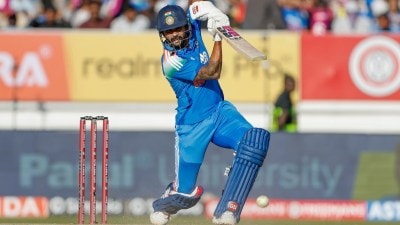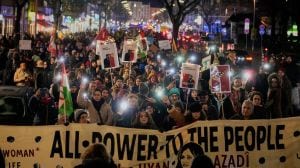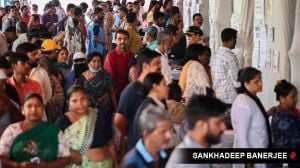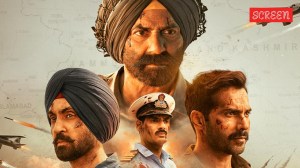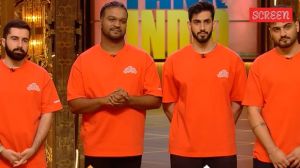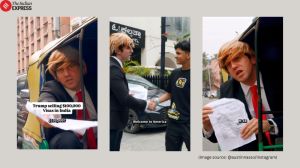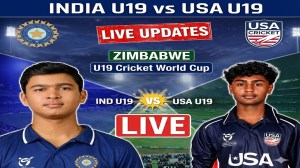Still Waters
DR Shriram Lagoo may be the better-known half, but his better half is a personality in her own right. Deepa Lagoo is a noted theatre actress...

DR Shriram Lagoo may be the better-known half, but his better half is a personality in her own right. Deepa Lagoo is a noted theatre actress and the first thing that strikes you about her is her voice. Over the telephone, the husky, well-modulated voice informs you with a sudden burst of laughter that on finding her house in Kothrud after many left and right turns to ring the second doorbell because the other one8217;s not working.
And on meeting the lady it8217;s the eyes that dominate the very expressive, mobile face, which obviously explains why she8217;s in the acting profession. Deepa Lagoo is not a formally trained actress, but courtesy her parents8217; involvement in Yakshagaan, a folk theatre group, she gradually got absorbed into the fold. In 1968, she took the plunge into amateur theatre, starting with Satyadev Dubey8217;s troupe. 8220;Although I was not formally trained in acting, the atmosphere on Dubey8217;s sets was one of study. So I did not miss out on institutional training,8221; says Deepa. Her first play, Adhe Adhure where she acted with Amrish Puri, Amol Palekar, Bhakti Barve and Lalita Karyekar was naturally a memorable one. She acted in both the Hindi and the Marathi versions, but cherishes the Marathi version 8220;because that8217;s where I met Shriram,8221; she lets on, laughing at the memory.
Initially she remembers going through the usual teething problems. 8220;At first I did not know if what I was doing was adequate. But fortunately in those days we got enough time to rehearse 8211; two to three months, and one could chew and mull over the portrayal,8221; she recounts. Lagoo was a regular in most of the amateur plays in Mumbai in the late 60s and 70s and she realised soon enough that her major assets were her voice and a certain body language, necessary requirements for theatre, besides having a good diction in Hindi. Deepa had trained in dance, Bharat Natyam and Kathakali, in her formative years and these have stood her in good stead through her career.
Deepa has joyous memories of her fun-filled theatre days. 8220;One can have a lot of fun with experimental, serious and meaningful theatre. There8217;s so much scope for improvisation,8221; is what she has to say on looking back.
She remembers different plays for different reasons. In 1982 she got the opportunity to act with Naseeruddin Shah and 8220;it was a great experience working with this brilliant actor. The Queen and the Rebels, directed by Shriram Lagoo, was again a thrilling experience because I was able to go beyond the demands of the role.8221; But on the other hand, Garbo was a script she could not relate to easily. 8220;I felt there was so much more to imbibe,8221; she ruminates. Her foray into TV serials in the mid-80s, starting with Anand Mahendroo8217;s Indradhanush were experiences which had their perplexing moments. One incident she remembers vividly was while rehearsing a shot for Mohena Singh8217;s Saara Jahan Hamara, where she was acting with seasoned actress Farida Jalal. 8220;I had these long dialogues in Hindi and I don8217;t know what happened, I gave take after take because I kept stumbling over my lines, 8221; she relates with a guffaw. Her mentor and guide Satyadev Dubey, had to be consulted and a new way ofmemorising had to be devised. 8220;After that I was rattling off my lines at top speed and everyone was wondering how that happened.8221;
Deepa feels that at present she is at a stage where she is looking back at what she8217;s done and in retrospect each phase has taught her something new about life and most important about herself. She always looks for roles which are creatively satisfying. Char Chaughi, a play directed by Chandrakant Kulkarni, was a step away from amateur to professional theatre. The play was a huge hit and as a role it was technically very sound and very relevant, feels Deepa Lagoo.
Deepa Lagoo has done her B.Ed in Special Education8217; and spent five years working in Dharavi in training teachers in non-formal methods of education. 8220;This was when I felt that all these years I had been spouting words like equality , freedom of expression were just words. During this time my values received a hefty shake-up and I came close to understanding what the words meant.8221; Taking time off from theatre, the five years were ones where she could widen her perspectives and begin the process of 8220;facing her inner self.8221;
And 8220;finding a different vocabulary for expression8221; is going to be her preoccupation in the immediate future, she says. Though theatre will not take a back-seat, Deepa is at a stage where she wants to explore all forms of creative expression. In Pune she and Ganoba Date, her friend, philosopher and guide and other friends from NOW Network of Well- Being have started a laboratory, called Sangati, which helps people overcome their blocks to creative expression. 8220;Unless you enact something you really do not know what happens,8221; she says. At meetings the participants take on different roles and 8220;just freak out,8221; using sound, movement and visualisation exercises, among other things.
After losing her young son, Tanvir, in 1994, Deepa felt her role of motherhood was over. Through Sangati she has got opportunities to extend it to others. And another thing which has hit her forcefully is that her personal experiences are real and significant, and that she needs to consider them an important resource even though they may seem unscientific. The Lagoos are planning to have a trust in his name to aid a needy student or an equipped actor. Which will keep his memory alive forever8230;
- 01
- 02
- 03
- 04
- 05


